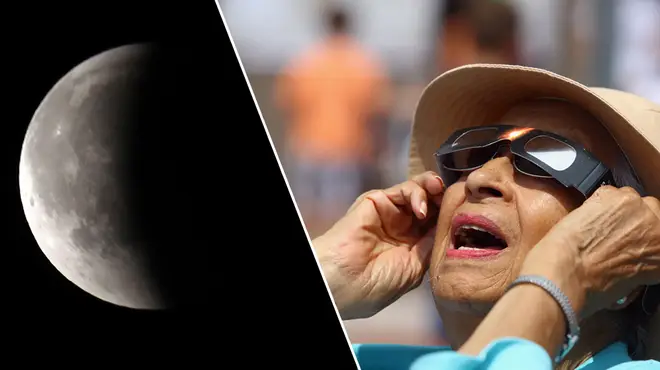On Air Now
Rob Howard and Kelly Brook 4pm - 7pm
2 July 2019, 11:33

Tonight, a total solar eclipse will be visible from parts of South America.
Areas of South America will bear witness to a total lunar eclipse this evening.
Here's what to expect from the spectacle, how to view it safely and what time it will be visible.
Solar eclipses occur when the Moon partially or fully blocks out the Sun.
A total solar eclipse is very rare, taking place approximately once every 18 months - which means two every three years.
Experts use the motion of the Sun and Moon, as well as measurements of the moon's distance from Earth, to predict when an eclipse will occur.
Tonight's solar eclipse will begin over the Pacific, with the moon's shadow (umbra) first casting over the body of water, near the eastern coast of New Zealand.
The eclipse will be visible from island of Oeno, a small spit of sand in the Pacific, around 10:24pm local time (18:24 GMT).
The moon's umbra will then reach the coast of Chile around 16:48 local time (20:38 GMT), before passing over the Andes in Peru.
At 17:44pm local time, the eclipse will be visible from the Chascomús, Buenos Aires, Argentina.
It is dangerous to look directly at a solar eclipse with the naked eye, as it can seriously damage the retina.
The condition is called solar retinopathy, and it is caused when the sun's light floods the retina and hits the back of the eyeball.
Over-simulation from sunlight can trigger an excess of communication chemicals, which is bad for the eye.
Most of the time, people won't feel the damage or notice it happening, as it is usually painless.
In order to avoid eye damage, sky gazers are advised to wear special eclipse glasses, which are made from black polymer. You can also make a box projector.
While there is no scientific proof that lunar eclipses affect people's moods, many believe in the "lunar effect".
Researchers from the University of Oxford and Ludwig Maximilian University published a study in 2008 in Current Biology. It stated: "Lunar cycles had, and continue to have, an influence upon human culture, though despite a persistent belief that our mental health and other behaviours are modulated by the phase of the moon, there is no solid evidence that human biology is in any way regulated by the lunar cycle."